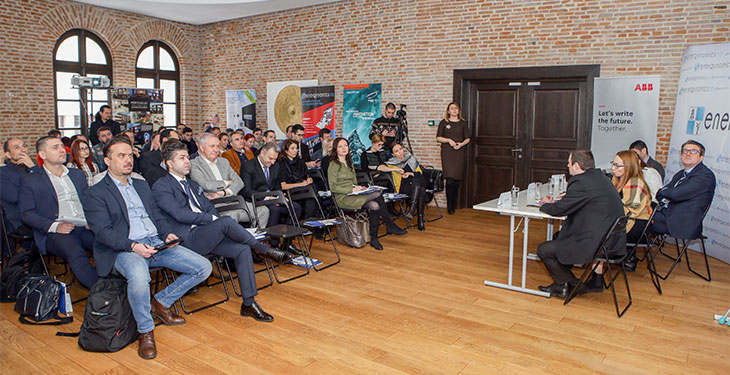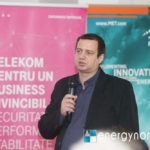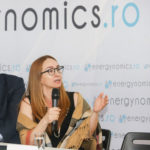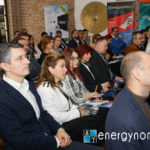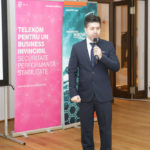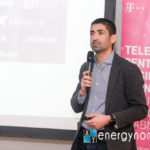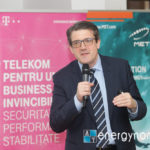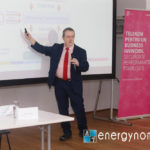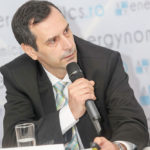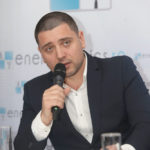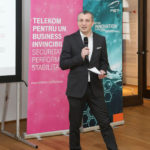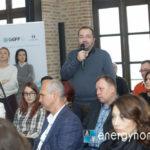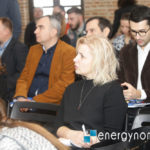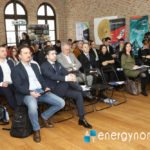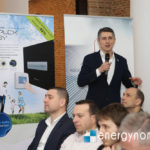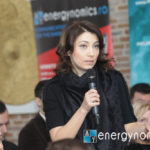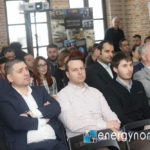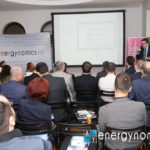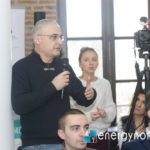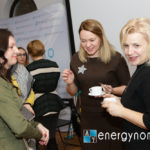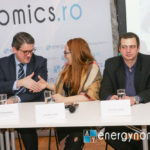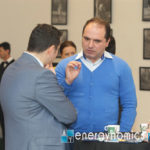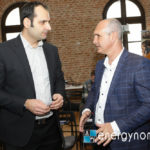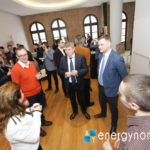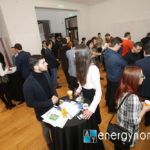Smart buildings are the future. Moreover, smart buildings are already the present. From different sectors and with specific approaches, each of the nine speakers invited to the Energy Breakfast Club edition on February 28 presented technology solutions, financial products, or critical information for a necessary change of mentality. Understanding the concept of smart building has to go beyond the experts’ circle by communicating and explaining the benefits (health, safety, savings in natural resources and money) that new technologies already provide to beneficiaries, to people living or working in today’s buildings.
Dr. Eng. Ionel-Puiu Golgojan, from the General Inspectorate for Emergency Situations (IGSU), launched the conversation, which often turned into real workshop with questions, suggestions and comments from experts among the over 60 participants at the conference organized by the Association of Real Estate Investors in Romania – AREI and energynomics.ro.
Fire Safety – Beyond Norms
IGSU registered 33,351 fires in 2017, nearly 20% more than in 2016. Fires produced in or near homes accounted for more than 35% of the total; vegetation fires apart (46% of the total), the most common causes were faulty electrical installations (27%), the defective or uncleaned chimney (15%) and the heating systems (6%). Lack of education and preventive behavior on the residents is also an influent factor, which is why IGSU carries out no less than 7 information campaigns at the moment!
DOWNLOAD THE PRESENTATION OF IONEL-PUIU GOLGOJAN
Existing fire prevention norms are respected at the level of residential construction projects, the IGSU representative said. As regards the quality of the work carried out and the verification of compliance with the projects’ specifications, the primary responsibility falls to the beneficiary at the time of reception. Some of the experts present argued that the role of IGSU should be increased to cover also compliance in the execution phase, in order to identify buildings non-compliant with fire safety rules. At the same time, the experts also noticed that the norms are ten years old, and outdated by far by the technological advance. New and safer solutions for fire prevention (including those caused by faults in electrical installations) have emerged, but in the absence of more stringent legal obligation (too many) developers choose cheaper, this less secure solutions.
Collaboration between technology companies and real estate developers
Antoanela Comşa, General Manager of Granvia Group of Companies and President of the Board of the Real Estate Investors Association of Romania – AREI, outlined the advantages of smart buildings described as facilities for the administrators / owners of the building, but also for its residents. Specifically, these allow the integration of building management activities at acceptable costs for increased comfort and safety of tenants. By way of example, the cost of technologies that turn a building into a smart one, mainly telecommunications, accounts for up to 20% of the cost of the entire building, a three times bigger share than 15 years ago. Providing a single cable network for all systems brings about 15-20% cuts in costs, Antoanela Comșa said.
Benefits of smart buildings
- low installation costs for control systems
- reducing operational cost of transformation
- investment ready for future interfacing devices
- reducing energy costs
DOWNLOAD THE PRESENTATION OF ANTOANELA COMȘA
The main obstacles to faster development of smart buildings are high costs, little awareness on the benefits, lack of fiscal and financial incentives, and insufficiently developed or solutions poorly adapted to Romania, the AREI chairman summarized. “We believe that better marketing, with the presentation of the end-customers’ benefits, better collaboration between technology providers and real estate developers, could lead to more smart buildings in the future,” Antoanela Comșa concluded.
Telekom: Integrated response by capitalizing on digital technology
Răzvan Ionescu, Business Segment Marketing Director at Telekom, began by explaining why did a large telecom company involved in the smart buildings segment: because of the major and ever-growing impact of digital technologies on contemporary lifestyle. “The 5G technology enables real-time connection at almost unlimited speed with very low latency, which means that it enables real-time automation of devices with almost immediate action”, Răzvan Ionescu summarized. Automated cars will be a form of manifestation of this trend, and smart buildings yet another major segment to be influenced by communications technologies, mainly on three lines of action: cost efficiency in the construction and operation of buildings, IoT (devices, sensors and connectivity), but also platforms and customized open data platforms and apps for analysis and interpretation.
“Telekom is already active in the IoT and smart buildings area in Romania, but mostly through many projects developed by Deutsch Telekom”. An End 2 End Smart Building Concept already implemented in Romania allows, among other things, for room booking and meeting rooms automation, asset and space utilization, and BMS integration.
The Telekom representative also mentioned some fire prevention solutions which identify areas of failure even before those occurred: “we can measure the level of noise at the ultrasonic level generated by faults in an electrical panel and we can identify the area where an incident may occur”.
Installations make buildings smart
Mihaela Guşă, Building Market Segment Manager at Schneider Electric Romania presented the EcoStruxure Power platform, an open energy management architecture that allows devices and equipment to be connected, automated data collection and analysis to make the right decisions.
“What we cannot measure we cannot optimize,” said Mihaela Guşă, detailing on the Schneider Electric proposal: implementing solutions to inform and educate the user, for understanding the situation, and anticipating any operational problems for a proactive reaction.
DOWNLOAD THE PRESENTATION OF MIHAELA GUȘĂ
“A building equipped with such facilities is more valuable, it is a building that can be rented or sold at better prices,” said Mihaela Guşă. In support of this assertion, Schneider Electric’s representative outlined some findings of a group-level research on the quantifiable benefits smart buildings: safety, reliability and energy efficiency. “Overall, implementing such solutions leads to an increase in initial investment of around 10-12%, with an investment recovery period of about two years.” In order to have more smart buildings, all those involved (developers, designers, regulators) are to understand these benefits and to communicate them effectively to the end-user, concluded Mihaela Guşă.
Digitization will not come. It’s already here.
The economic impact of digitization is estimated to be of at least four thousand billion dollars annually by 2025, said Tomasz Wolanowski, Country Managing Director of ABB Romania, in the opening of his presentation, citing the results of a study by McKinsey Global Institute. As an active player in all sectors that are and will be affected by the impact of digitization, ABB has already implemented and tested solutions for the utilities, industry, transport and infrastructure.
“With remote monitoring, we can often detect up to 90% of problems as they arise. We can reduce maintenance costs by 20% and save energy by 5% in shipping and other transportation sectors”, said Tomasz Wolanowski. He presented the benefits of an ABB Ability™ platform, described as a set of enabling top quality technologies that delivers customer benefit (uptime, speed, yield).
DOWNLOAD THE PRESENTATION OF TOMASZ WOLANOWSKI
“Digital wave is transforming every aspect of our lives, and digital opportunity is here already. We need to combine IT innovations with operational technology expertise, a field where ABB Ability is already available with a wide range of industry-leading solutions”, concluded Mr. Wolanowski.
We have to put the products into the end user’s hand
Mark Velody, Project Manager – EBRD GEFF Romania / Tractebel Engineering has presented the latest EBRD financing initiative for energy efficiency in Romania. “What we are proposing is to turn an idea into an actual investment that results in increased energy efficiency, in a simple and bureaucratic way,” Mark Velody stressed.
Crafted for the residential sector, the initiative provided 100 million euros through two commercial banks (Banca Transilvania and Unicredit), with the technical support from Tractebel Engineering.
DOWNLOAD THE PRESENTATION OF MARK VELODY
Through partner banks, individuals can obtain financing at lower costs than those in the market to improve the energy performance of their homes through mortgages, consumer loans and credit cards.
Mark Velody has presented the eligibility conditions for mortgage loans to improve the building’s energy performance, as well as the online platform (technology selector) where top technologies for heating, ventilation, lighting, insulation, all certified as energy efficient by the technical expert Tractebel Engineering.
For more information, visit the facility’s website or contact the facility consultant Tractebel Engineering by sending an email or using the help line 031 22 48 104.
Smart building dashboard means efficiency and comfort
In his speech, Andrei Bucur, Business Development Manager at MET Romania Energy Marketing, proposed a distinction between smart buildings (summed up as an automated or largely automated self-monitoring building) and green buildings (those that have very little to no impact on the environment). Ideally, a smart building provides a complete dashboard with real-time information and control over the lighting system, acclimatization, safety and metering.
DOWNLOAD THE PRESENTATION OF ANDREI BUCUR
The representative of MET Romania presented a case of successful collaboration with a developer who “understood that it is not the aspect of building that makes the difference, but the embedded technology.” In the smart residential area of Popasului Residence, in Northern Bucharest, each house was equipped with photovoltaic panels and smart home system, meant to ease the life of the user and at the same time to improve the energy consumption. “Photovoltaic panels come with a significant contribution to the heating of the house and a low cost in the utilities bill,” explained Andrei Bucur, who continued: “The smart house means more than automation and remote control of the artificial lighting, the air conditioning system or draperies”. In the case study presented, MET designed and implemented a connection between the heating system and the photovoltaic panels, so that in winter, the heating system starts on air conditioning and heats the building until the batteries are consumed. From that point on, the system shuts down the power supply and starts the system on natural gas, which is cheaper than electricity, at the moment. “I think this is the direction to follow – concrete solutions for better control and increased comfort at lower costs,” Andrei Bucur summarized.
Niagara – Smart Building Management Solution
Adrian Vlăduţ, Application Engineer at Phoenix Contact presented the approach of the Knowledge Center for Buildings and Internet of Things within the German group Phoenix Contact. Sysmik GmbH, from Dresden, part of the group established in 1923, has developed a software platform (Niagara) that, in combination with hardware, allows for simple, safe and efficient building management.
DOWNLOAD THE PRESENTATION OF ADRIAN VLĂDUȚ
Adrian Vlăduţ presented the ILC 2050 BI scalable industrial programmable machine that supports a modular input / output system, a simple configuration and perfect integration with the software platform. The ensemble provides a detailed and spectacular visualization of the sub-systems specific to complex buildings for:
- monitoring and optimizing energy
- control of renewable energy
- building management
- maintenance of facilities
- security
- e-mobility
The case study – Building 4 on the Phoenix Contact Electronics campus in Bad Pyrmont (Germany) – has proven the effectiveness of the proposed system, including through a quick recovery of the investment, as a result of a 43% reduction in annual maintenance costs.
ATREA: Complete apartment ventilation systems with individual billing
Dorin Șalamac, General Manager for Romania, presented the product lines of ATREA, a group founded in 1990 and present now in more than 23 countries. He talked about the kitchen line – ventilation ceilings and kitchen hoods – which provide air extraction, filtration, heat recovery and fresh air supply. “The biggest losses are due to the behavior of the users, who use the equipment at maximum power, even when this is not necessary,” said Dorin Şalamac. “To eliminate these losses, we have an automated control system for commercial kitchens adapting to the level of use of cooking appliances.”
ATREA’s main product line consists of compact, small units air systems with high quality components and performances that exceeds the levels required by international norms and certifications. “For example, the minimum counter flow in hear exchangers should be 73% and our products got a heat recovery rate of 93%,” said ATREA representative.
DOWNLOAD THE PRESENTATION OF DORIN ȘALAMAC
In the residential sector, the Duplex EC5 and ECV5 systems are already deployed in over 30 buildings in the “Amber Gardens” complex with passive houses. “In addition to equipment and products, the smart-box solution is designed for apartment blocks as it allows independent control for each individual apartment and individual billing,” explained Dorin Șalamac. Such solutions are also suitable for educational spaces – schools, kindergartens, etc. – where rehabilitation (through exterior insulation, insulated windows etc.) does not solve the problem of air quality. „Our device can be easily mounted in existing buildings because it does not involve piping systems and has excellent air-freshening results”, said ATREA representative, with reference to the DUPLEX INTER 850 units, installed in a pilot project at Mihai Viteazul High School in Bucharest.
Over 60 representatives from ABB România, AICPS, AON, ATREA, Automobile Bavaria, BTRL, CBRE Romania, EfdeN, Electrogroup SA, EnergoBit, Enevo Group, ENGIE, Erste Group Immorent, ESIMO România, Eximprod Grup, General Investigation, Global Technical Controls, IGSU, JQ Development, KNX, MET România Energy Marketing, Microsoft, MoneyCorp, Nepi Rock Castle, Norisk Imobiliare, Phoenix Contact, Photon Energy, Popasului Residence, Ruxpro, Schneider Electric, SGS România, Socomec, Stratum Enclosures, Talent Reserve, Telekom, Tractebel Engineering, Transgaz attended the presentations and participated in discussions.
This edition of Energy Breakfast Club was organised by the Association of Real-Eastate Investors – AREI and energynomics.ro, with the support of our partners: ABB România, Aon România, ATREA România, MET România Energy Marketing, Phoenix Contact, Schneider Electric, Telekom România, Tractebel Engineering.
Participation
This year, energynomics.ro will organize 10 Energy Breakfast Club meetings. The schedule and the proposed themes for 2017 are available in the Energy Breakfast Club dedicated page.
